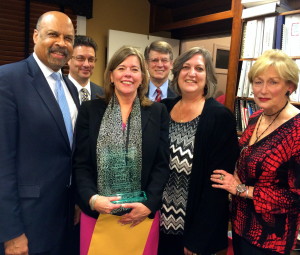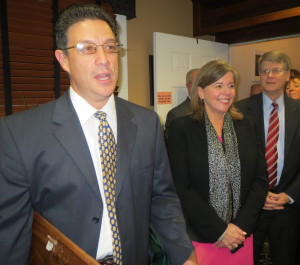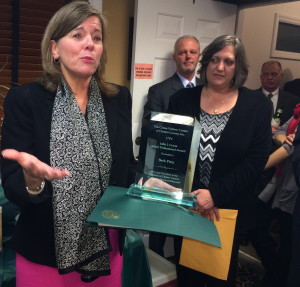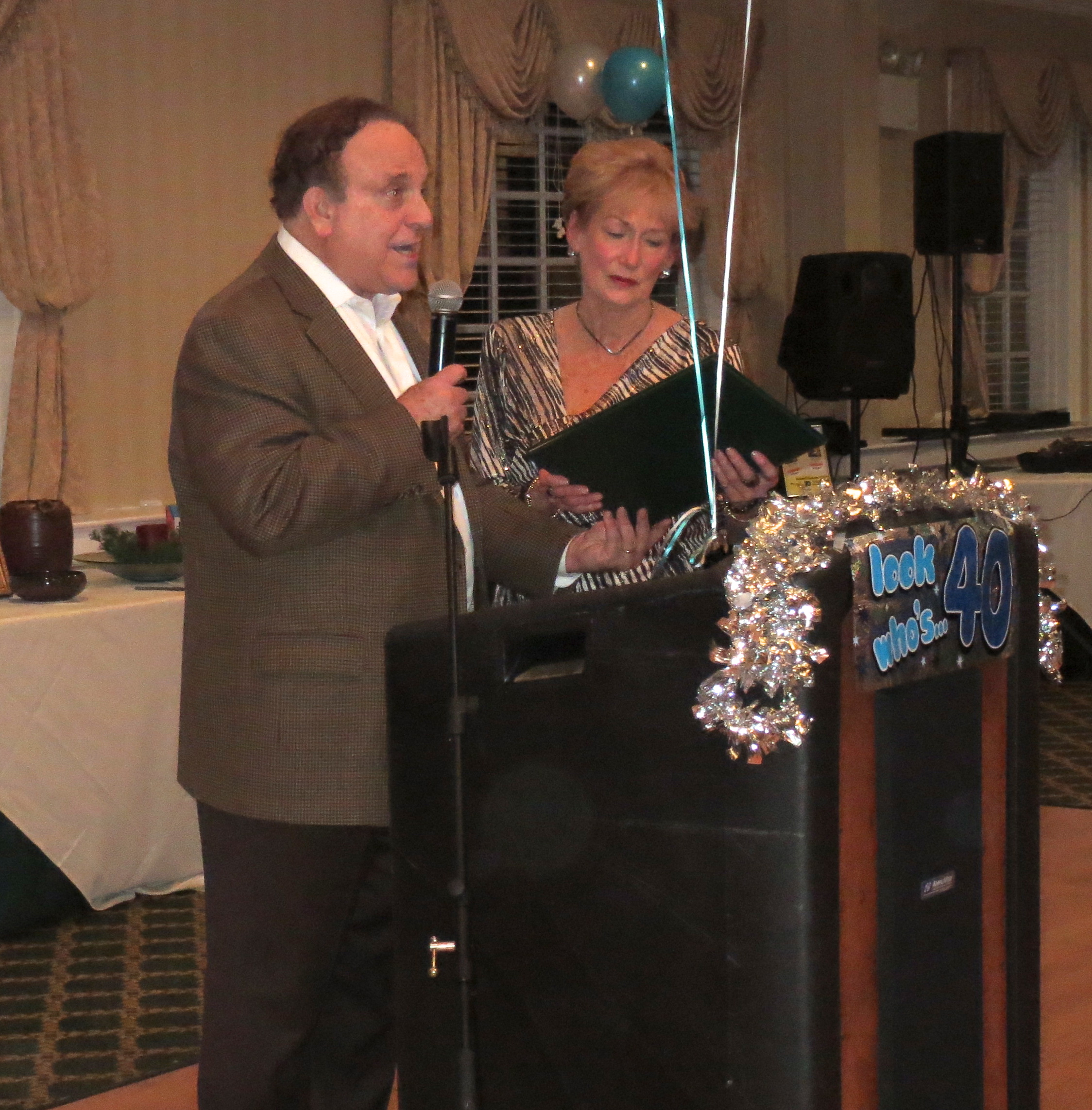Former deputy district attorney lauded by Crime Victims’ Center, commissioners
By Kathleen Brady Shea, Managing Editor, The Times

Former Chester County District Attorney Joseph W. Carroll (right), now a Crime Victims’ Center board member, tells Elizabeth B. Pitts why she was selected to receive the 2013 John J. Crane Award as attorney Dawson R. “Rich” Muth smiles in agreement.
Many of the cases handled by a former veteran prosecutor generated salacious headlines: The 15-year-old girl routinely raped by her stepfather who remained mute until her mother was victimized; the 3-year-old boy abused and fatally beaten by his mother’s boyfriend; the mail-order Russian bride’s 5-year-old daughter, who became the focus of her stepfather’s pornographic movies; or the former female lacrosse coach who shared secrets, alcohol, and sex with teenage boys.
But the high-profile work done by ex-Chester County Deputy District Attorney Elizabeth B. Pitts for two decades was not what led to her selection as the Crime Victims’ Center of Chester County’s (CVC) 2013 recipient of the John J. Crane Award.
Speaking at a ceremony to recognize Pitts on Thursday night, Dec. 5, both the agency’s executive director, Peggy Gusz, and former District Attorney Joseph W. Carroll, now a CVC board member, stressed that Pitts was being recognized for the efforts she expended long after her work day had ended – and long after a case had been successfully resolved.

Elizabeth B. Pitts (third from left) is joined by County Commissioner Terence Farrell (from left), CVC Board President Jose Reyes, CVC Board Member Joseph W. Carroll, County Commissioner Kathi Cozzone, and CVC Executive Director Peggy Gusz.
Jose Reyes, the agency’s board president, explained that the John J. Crane Award was established by the center to pay tribute to the late Chester County prosecutor, a nationally recognized advocate for crime victims – especially children.
Carroll pointed out that Pitts, who headed the Child Abuse Unit from 2001 to 2013, was the driving force behind the development of the Child Advocacy Center. “While that background is important, I don’t think Beth – or anyone else – deserves the award for doing her job, even if he or she does it well,” Carroll said. “But Beth went way beyond her job requirements for many years and in many ways. The first 40 hours each week were her job: The other 800 to 1000 [unpaid] hours she worked each year were not.”
Gusz concurred, adding that Pitts put “her heart and soul” into each case, ensuring that victims’ needs were met and keeping in touch with them years after the prosecution concluded. “She was a very giving person,” said Gusz, adding that her staff would often comment on steps Pitts took behind the scenes to make sure victims were doing well in school or getting the appropriate counseling. “She was totally committed to the child beyond the case.”
Carroll added that Pitts often “adopted” families in need at Christmas time, helped train CVC staff, helped victims and families with the collateral consequences of abuse, and made direct donations to the CVC to assist with its work.
Pitts also received a commendation from the Chester County Commissioners, applauding her two decades of contributions to the justice system, especially on behalf of child victims.
Reacting to Pitts’ selection, Jeffrey S. Gordon, a retired Chester County detective/sergeant who worked with her in the child-abuse unit for more than a decade, called her “a staunch advocate for child protection.” He said she was “a leader in the movement to get the Chester County Child Advocacy Center accredited.” It is a child-friendly facility housed in the county’s Justice Center, where a multidisciplinary staff – including police, prosecutors, and child-welfare advocates – interview victims and families and use a team approach to investigate and review cases.

CVC Board President Jose Reyes (from left) explains the background of the John J. Crane Award as Elizabeth B. Pitts and Joseph W. Carroll listen.
Gordon said Pitts was also instrumental in promoting the forensic interview, a procedure that requires intensive training. “Basically you want to get a child to say what happened without leading them,” he said. “That can be very difficult.” Gordon said Pitts watched thousands of taped interviews, realized the importance of proper training, and then advocated for it.
“The work she has done will continue to help other children for many years to come,” said Carroll. “This is not intended as a ‘lifetime achievement award’ because Beth headed the child abuse unit for many years, and I would not be in favor of that practice … I think she deserves the award, not because of the position she held, but because of all the things she did when no one was looking, outside the scope of her job duties.”
Patrick Carmody, a longtime prosecutor who was recently elected to the Chester County bench and was a previous recipient of the John J. Crane Award, agreed. “It is appropriate that Beth won this award. John Crane had great respect for Beth. And for good reason,” Carmody said. “Beth’s career was one of self-sacrifice to help the most vulnerable. I am hard-pressed to think of a DA who has positively affected more lives.”

Elizabeth B. Pitts (left) explains why the 2013 John J. Crane Award means so much to her as attorney Dawson R “Rich” Muth, County Commissoner Kathi Cozzone, and Chief County Detective James Vito look on.
Pitts said she was humbled and appreciative of the award for many reasons, not the least of which was the fact that it stemmed from her work on behalf of children and came from an internationally acclaimed agency whose mission is advocating for victims. “To be honored by you means so much … more than you can ever know,” Pitts said.
She said the award was also special because of her respect for Crane. She said she had the pleasure of working with him during his last trial. “When I say work with him, I drove him to appointments with witnesses, I took notes for him, and I did my very menial contributions,” she said.
Despite her gofer role, Pitts said she received a crash course in prosecutorial child advocacy. “What was amazing in that experience is that I learned so much from John in that little bit of time I spent with him directly, and I got gems from him on how to handle a trial, how to interview witnesses…,” she said.
Pitts’ notable achievements capped a career as a prosecutor that didn’t exactly represent her first choice. She graduated from Philadelphia College of Art in 1983 with a bachelor’s degree in fine arts and a minor in art therapy. But her creative instincts pulled her away from a palette: She envisioned a career as an actress and even moved to New York to pursue that goal.
Several years later, she switched gears and ended up at Widener University School of Law, graduating in 1993 and getting a job in the Chester County District Attorney’s Office, where she prosecuted hundreds of cases, including homicides, sexual assaults, white-collar crimes, and child-abuse cases. In 2000, her skills in handling the latter led to her placement in the Chester County Child Abuse Unit, which specializes in child physical and sexual abuse cases.
In addition to trying about 55 jury trials – most of her cases resulted in guilty pleas – Pitts has served as a guest lecturer on child abuse and Megan’s Law-related topics at West Chester University, Wilmington College, and Alvernia University. She has also been a member of the faculty for the Widener University School of Law trial advocacy program (ITAP).
Pitts, who now works at Swarthmore College, said she was ready for a change. Many of the cases she handled have left indelible, searing memories, and she said that she often worries about how the victims are doing. However, she said she expects to return to some sort of child-advocacy role. “I’m sure I’ll find a way to serve children in the future,” she said. “I haven’t figured that out yet.”






